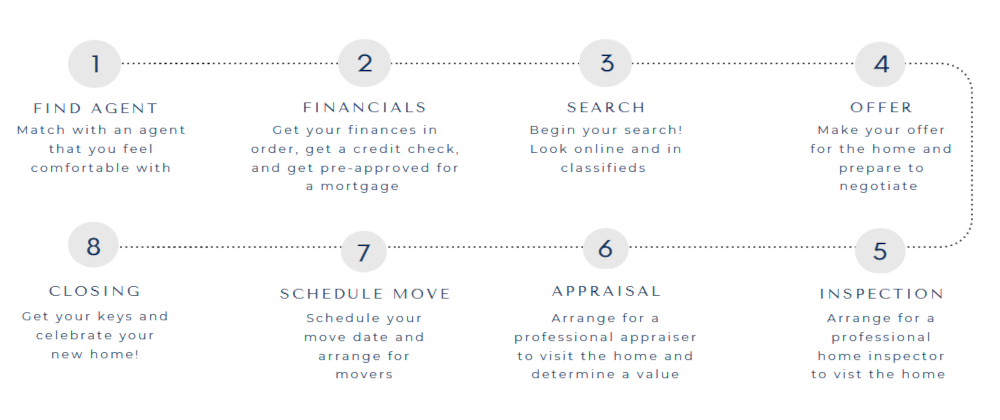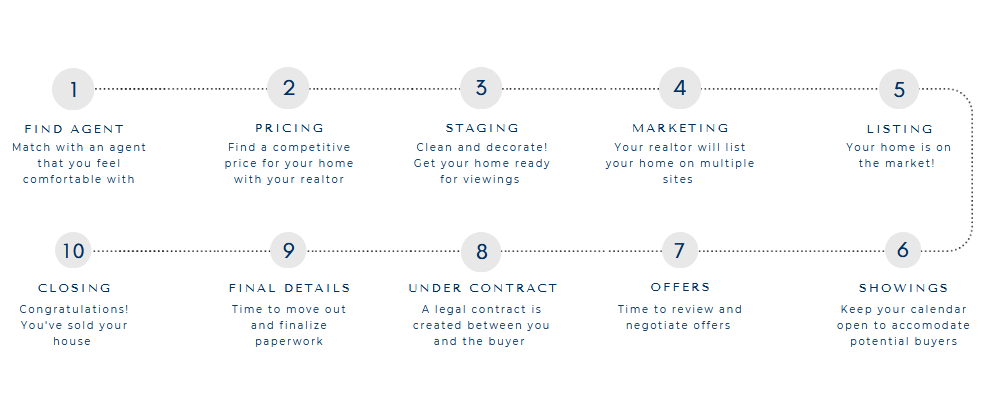Real Estate Buyers Roadmap

Buying your first home is an exciting and rewarding experience, but it can also be overwhelming and stressful. With so many decisions to make and so much money on the line, it’s important to be prepared and informed before you start the process. To help you get started, here’s a high-level overview of what you can expect when buying a home.
1. Find a Real Estate Agent that you feel comfortable with.
A real estate agent is a huge asset to you as you go through the home-buying process. This is one of the biggest decisions of your life and you need a skilled professional guiding you through the process. Your agent will be working with your best interests in mind and can help guide you through all the stages of home buying.
2. Get your finances in order.
Determine your budget
A good rule of thumb is to stay within a budget of 3-5 times your annual income when purchasing a new home. When determining your mortgage, don’t forget other factors like: down payment, legal fees, taxes, home inspection costs, appraisal costs, and renovation costs.
Determine your down payment
A 20% down payment is the most common, however, it is not your only option! Have a discussion with your lender to determine what works best for your scenario.
Check your credit score
Your lender will probably perform a credit check prior to approving a mortgage and determining your interest rate. The most ideal range will be 620 or above. The better your score, the lower the interest rate you will be charged on your mortgage.
Get pre-approved for a mortgage
Do not confuse pre-qualification with pre-approval. Pre-qualification simply indicates that your lender thinks you will be approved for a loan up to a certain amount. But it has not gone through the extensive documentation and background checks that a pre-approval requires. Obtaining a pre-approval on your mortgage will help you in many ways. First it will help you determine your budget, and that will help you stay within your means. Second it shows sellers that you are serious about purchasing a home, and that you have the funds necessary to complete the purchase.
No big purchases
It is important not to make any significant purchases or alter your credit score in any way during this time.
3. Begin your search!
Once you have your pre-approval letter in hand, it’s time to start searching for your new home.
Prepare for house-hunting
Before you start searching for your new home, make a list of your must-haves and must-not-haves. This will help you and your real estate agent narrow down the endless list of properties to the exact ones that fit your requirements.
You might also want to drive through several neighborhoods and even visit open houses to get an idea of your likes and dislikes.
Home search tips
- Take photos as you go through houses to remind you of the layout and the feel of each house you visit.
- Pay attention to features of the property that are fixed such as the neighborhood, the lot size, and the orientation of the home. Don’t pay too much attention to the colors of the walls or the furniture.
- Be sure to check out the small details like the light switches, water features, and appliances to make sure everything works.
4. Make your offer and prepare to negotiate.
Once you find a house you love, you can make an official offer to the seller. Don’t be afraid to make an offer below the listed price. Sellers often price higher than they would be willing to sell for. Your real estate agent will be in the best position to advise you on what the best offer would be.
Be prepared to receive a counter-offer, and don’t be afraid to bargain for your purchase. Be sure to know what you are buying and ensure that you feel the price is fair at the end of the day
5. Arrange for a professional home inspection.
Make sure that you allow for an inspection to be completed prior to the closing of the sale. It is important to know as much about your home as possible. If anything serious comes out of the inspection, you have an option to back out of the agreement, or gives you more negotiating power.
Feel free to ask your inspector to take pictures and be descriptive in their report. You can also ask for a meeting with the inspector to better understand their findings.
Once the inspection is complete, you can discuss and negotiate with the seller any final points.
6. Arrange for a professional home appraisal.
Your lender will want a formal appraisal of the home prior to issuing your loan and will also require you to purchase home insurance for your new property!
7. Schedule your move date and arrange for movers.
Some things you will want to keep in mind closer to your move date:
- Movers
- Renovators/ contractors
- Utilities
- Cleaners
- Move out details
8. Closing – Congratulations, you are now a homeowner!
Closing is the final step for you to become the legal owner of your home. You will take a final walk-through just before closing to ensure that negotiated work has been completed and everything is in working order.
The closing process itself requires a lot of paperwork and patience. Be prepared with your government issued photo ID, cashier’s check and any other documents required by the title company or loan officer.
Don’t forget to re-key all the locks and change the garage door opener code when the property is officially yours.
Congratulations on your new home!




Responses